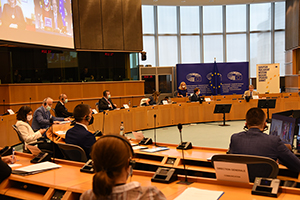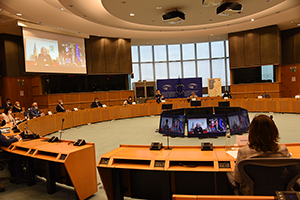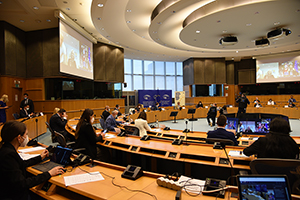 Monday, 28 June 2021, Brussels
Monday, 28 June 2021, Brussels
Address of President Xhaferi at the EP – Western Balkan Speakers’ Summit on the topic:„The fundamental role of parliaments in the EU enlargement process in the post-COVID era”
Distinguished President Sassoli,
Distinguished colleagues,
Distinguished guests,
Primarily, allow me to express my pleasure on holding the today’s Summit again, the continuity of which besides the current emergency conditions clearly confirms the support of the European Parliament for the European perspective of our region. At the same time, I would like to extend my gratitude to President Sassoli for his contribution so far and his selfless commitment to advancing the European integration of all Western Balkan countries and promoting the role of national parliaments in that process.
The Summit is being held at a time when we as states and national parliament are dealing with many issues both in terms of the current pandemic, and in terms of our integration path to EU membership. The pandemic showed all of its bad and good sides, and we as politicians to date have had sufficient time to see the weaknesses and advantages and to appropriately plan our activities in the future.
On the one hand, the partial or complete paralysis of our societies in the wake of the pandemic has raised a series of issues on the thin line of separation of the powers between the executive and legislature. The main features of parliaments in all European democratic societies, more precisely, their legislative, control and information function seem to have been once again questioned in the decision – making process, comparatively speaking in the context of the pandemic and historical development of today’s European Union.
 The Assembly of the Republic of North Macedonia also faced many dilemmas in the past year, due to different interpretations in the existing legal framework, political dissent of the opposition for remote working, which implied activities reduced to a minimum in accordance with medical protocols and restrictive measures for physical access of the public in the Assembly building. As a result of these undertaken steps, the citizens started a more massive of use the digital platforms to obtain information, which allowed certain centers of power a domination of that space for their own purposes. Through the abuse of the corona narrative, we have often had a flood of misinformation in terms of the pandemic, government activities to deal with its consequences, but also in terms of the European integration process, that forced us as politicians to react promptly and ensure that accurate information will eventually reach to the citizens.
The Assembly of the Republic of North Macedonia also faced many dilemmas in the past year, due to different interpretations in the existing legal framework, political dissent of the opposition for remote working, which implied activities reduced to a minimum in accordance with medical protocols and restrictive measures for physical access of the public in the Assembly building. As a result of these undertaken steps, the citizens started a more massive of use the digital platforms to obtain information, which allowed certain centers of power a domination of that space for their own purposes. Through the abuse of the corona narrative, we have often had a flood of misinformation in terms of the pandemic, government activities to deal with its consequences, but also in terms of the European integration process, that forced us as politicians to react promptly and ensure that accurate information will eventually reach to the citizens.
On the other hand, the pandemic has shown that virtual events enabled certain continuity in terms of the conduct of parliamentary diplomacy, allowing the realization of international meetings which in standard circumstances require greater organization and preparation. A major part of international activities in the Assembly of the Republic of North Macedonia, but also activities with NGOs so far are taking place smoothly online. Therefore, a general conclusion can be that the traditional operation of parliaments, physical presence and our personal contacts are undoubtedly the best and irreplaceable modus operandi, and the occasional use of the hybrid or virtual format of work can serve quite solidly in conditions when physical presence is impossible and to ensure greater inclusion of civil society, especially during the negotiations.
EU integration, as a result of the early parliamentary elections and the pandemic, did not mark the same intensity as in previous years. Our greatest achievements, in accordance with the European criteria, the adoption of the package of complex reforms and overcoming the long-standing open issues with neighbors, still did not take us to the next stage of the integration process, due to unilateral requirements on certain historical issues. Given the turbulent past of the region, if they become part of the package of  binding criteria, they could seriously undermine the credibility of the Union and the concept of the enlargement process. They should not have a place in the European integration portfolio and therefore an urgent response and offer of concrete roadmaps is needed for the Western Balkan on the next steps to their EU membership, and for the Republic of North Macedonia to hold the first Intergovernmental Conference.
binding criteria, they could seriously undermine the credibility of the Union and the concept of the enlargement process. They should not have a place in the European integration portfolio and therefore an urgent response and offer of concrete roadmaps is needed for the Western Balkan on the next steps to their EU membership, and for the Republic of North Macedonia to hold the first Intergovernmental Conference.
During the negotiations, the Assembly will continue to have an active, visible and constructive role and with its proposals and suggestions will contribute to the adoption of the necessary legislation and building social consensus on the benefits and challenges of accession to the EU. Given the complexity and scope of the European legislative package, we expect further continuous and fruitful cooperation at all levels with the European Parliament as our longtime supporter and partner, but also with all countries from the region with which we nurture the determination to share common European values. The future of all of us is in the EU and the region has no other future. It should be one of the main messages to be delivered after the end of this Summit.
Thank you for the attention.